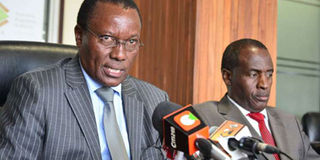Meeting to tackle fraud in insurance

Insurance Regulatory Authority (IRA) CEO Sammy Makove (left) and the Association of Kenya Insurers (AKI) Executive Director Tom Gichuhi during a press conference on Insurance fraud at the authoritys offices in Nairobi on November 30, 2015. The insurance regulator says it has lined up yet another crisis meeting with chief executives of companies to explore potential solutions in curbing runaway fraud in the sector. PHOTO | SALATON NJAU | NATION MEDIA GROUP
What you need to know:
- The insurance regulator says it has lined up yet another crisis meeting with chief executives of companies to explore potential solutions in curbing runaway fraud in the sector.
- This comes amid mounting consensus that the vice, especially in the medical class, has evolved into organised crime.
- Employees of healthcare providers and those of insurance companies have increasingly been suspected of involvement and collusion in the making of fraudulent claims, with players warning that if unchecked, this could bring the medical insurance industry to its knees.
- The Insurance Regulatory Authority (IRA) chief executive Sammy Makove told the Daily Nation in an interview that the meeting set for next week would build upon proposed solutions by industry stakeholders with an eye on new strategies and measures to curb fraud.
The insurance regulator says it has lined up yet another crisis meeting with chief executives of companies to explore potential solutions in curbing runaway fraud in the sector.
This comes amid mounting consensus that the vice, especially in the medical class, has evolved into organised crime.
Employees of healthcare providers and those of insurance companies have increasingly been suspected of involvement and collusion in the making of fraudulent claims, with players warning that if unchecked, this could bring the medical insurance industry to its knees.
The Insurance Regulatory Authority (IRA) chief executive Sammy Makove told the Daily Nation in an interview that the meeting set for next week would build upon proposed solutions by industry stakeholders with an eye on new strategies and measures to curb fraud.
“Medical insurance has become the biggest class of business in the last few years in terms of growth. However, we have seen the class making losses. We called a meeting and identified fraud as the challenge. Another meeting is scheduled in a week’s time with all players. We are trying to carry out a diagnostic of what is the challenge and also the way forward,” he said.
INFORMATION TECHNOLOGY
Mr Makove said investment in information technology systems would top the agenda as biometrics had emerged as a sound option for identifying and authenticating patients when interacting with health care providers.
He said a huge number of insurance firms had not invested adequately in state-of-the-art IT systems, making them easy prey for cartels in the sector.
“In view of this, we are going to require that before a company is registered, it exhibits the capacity to curb fraud through foolproof IT systems,” said Mr Makove.
Experts say the new push is timely and could help the sector.
“It has been no secret that system losses have been high in the insurance business. IT and biometric data is a silver bullet when it comes to reducing system losses, so I think this move is to be welcomed,” said Nairobi-based analyst Aly Khan Satchu.
Biometric technologies are used to identify persons by comparing their fingerprint, palm, iris, and facial attributes with a stored similar information about them.





